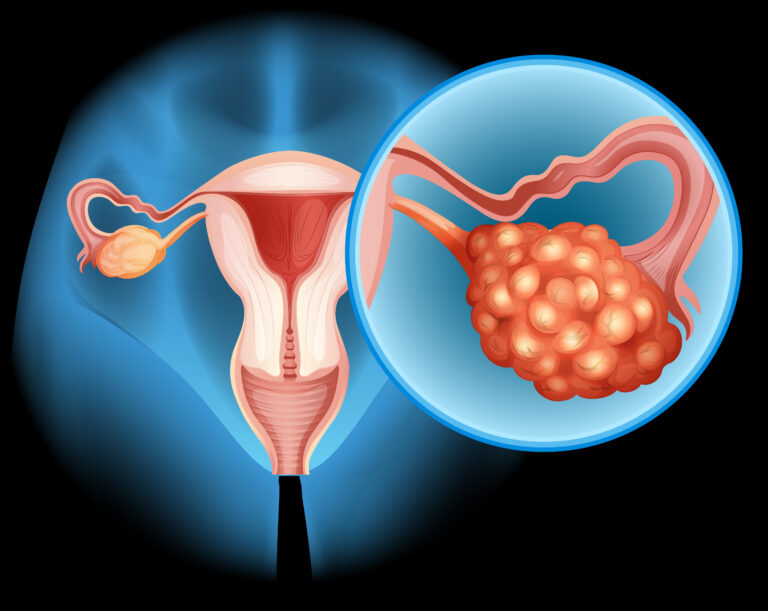
Are you one of the millions of women struggling with Polycystic Ovarian Syndrome (PCOS)? This condition can be challenging to manage, but incorporating Pilates into your routine can be a game-changer.
Pilates focuses on strengthening and stabilizing the body, which can help alleviate some of the most common symptoms of PCOS, such as insulin resistance, weight gain, and irregular periods.
In this article, we’ll explore how Pilates can benefit those with PCOS and provide tips on how to get started. So grab your mat and let’s dive in!
Understanding Polycystic Ovarian Syndrome: An Overview of Symptoms and Causes
Polycystic Ovarian Syndrome (PCOS) is a hormonal and metabolic disorder that affects women’s health, appearance, and fertility.
PCOS is caused by a hormonal imbalance in which the body produces too much androgen hormone and it is characterized by the presence of multiple cysts on the ovaries, as well as symptoms such as irregular periods, excess hair growth, and acne.
PCOS is also associated with an increased risk of certain health conditions, such as diabetes and heart disease. The exact cause of PCOS is not fully understood, but it is thought to be related to a combination of genetic and environmental factors.
Common Symptoms of PCOS
The symptoms of PCOS can vary from person to person and can include:
Irregular menstrual periods
Women with PCOS may have fewer than nine periods a year, or have periods that are heavy, irregular, or prolonged.
Excess androgen production
Androgens are male hormones that are also present in females. Women with PCOS may produce higher levels of androgens, which can cause excess facial and body hair, acne, and male-pattern baldness.
Polycystic ovaries
Women with PCOS may have enlarged ovaries with many small cysts.
Weight gain
Women with PCOS may have difficulty losing weight and may gain weight easily.
Insulin resistance
PCOS can cause insulin resistance, which can lead to high blood sugar levels and an increased risk of type 2 diabetes.
Mood changes
Women with PCOS may experience mood swings, anxiety, and depression.
Infertility
PCOS is a leading cause of infertility in women due to irregular ovulation and hormone imbalances.
It’s worth noting that the symptoms of PCOS can vary greatly between individuals, and not every woman with PCOS will experience all of these symptoms. Additionally, the severity of symptoms can differ as well.
Causes and Risk Factors of PCOS
Causes:
- The exact cause of PCOS is unknown, but it is thought to be related to hormonal imbalances in the body.
- Women with PCOS may have higher levels of androgens, which are male hormones that females also produce in smaller amounts.
- Insulin resistance and inflammation may also play a role in the development of PCOS.
Risk factors:
Family history
Women with a mother or sister with PCOS are more likely to develop the condition.
Age
PCOS can develop at any age, but it is most commonly diagnosed in women in their 20s and 30s.
Obesity
Being overweight or obese can increase the risk of PCOS.
Other health conditions
Women with certain health conditions, such as diabetes, thyroid disorders, and depression, may be at a higher risk for PCOS.
Diagnosing PCOS: Methods and Procedures
The diagnosis of PCOS is usually made by a healthcare professional, who takes into account the patient’s medical history, performs a physical examination, and conducts laboratory tests. Here are some common diagnostic criteria for PCOS:
Menstrual cycle irregularities
The healthcare provider may ask about the patient’s menstrual cycle to determine if there are any irregularities such as infrequent periods, heavy bleeding, or absence of periods.
Physical exam
The healthcare provider may perform a physical exam to check for signs of excess hair growth, acne, and weight gain.
Blood tests
Blood tests may be done to check for high levels of androgens (male hormones), insulin resistance, and other metabolic markers.
Imaging tests
Imaging tests such as ultrasound may be done to check for the presence of cysts on the ovaries.
To be diagnosed with PCOS, a patient must meet at least two of the following three criteria:
- Irregular menstrual cycles
- High levels of androgens (male hormones)
- Presence of cysts on the ovaries
Potential Complications of PCOS
PCOS can lead to several potential complications, including:
Infertility
Due to hormonal imbalances, PCOS can cause irregular or absent ovulation, which can make it difficult to conceive.
Diabetes
Women with PCOS are at an increased risk of developing type 2 diabetes due to insulin resistance.
Cardiovascular disease
Women with PCOS have a higher risk of developing high blood pressure, high cholesterol, and heart disease.
Endometrial cancer
Women with PCOS are at a higher risk of developing endometrial cancer due to an overgrowth of the uterine lining.
Depression and anxiety
PCOS can affect a woman’s emotional well-being and increase the risk of depression and anxiety.
Sleep apnea
PCOS is linked to sleep apnea, a condition where breathing repeatedly stops and starts during sleep.
It’s essential for women with PCOS to receive appropriate medical care and management to reduce the risk of these potential complications.
Thank you for reading part 1 of this article on PCOS. If you’re looking for ways to manage your PCOS symptoms and improve your overall health and well-being, then you wouldn’t want to miss part 2 where I explore how Pilates can benefit those with PCOS.
In part 2, I’ll dive into the specific ways that Pilates can help alleviate common PCOS symptoms such as insulin resistance, weight gain, and irregular periods. I’ll also provide tips on how to get started with Pilates and share some exercise videos to help you incorporate Pilates into your routine.
Don’t miss out on this valuable information. Be sure to check out part 2 of this article on Pilates For PCOS: Strengthening The Body And Managing Symptoms
© 2023 Tanushree Jain
